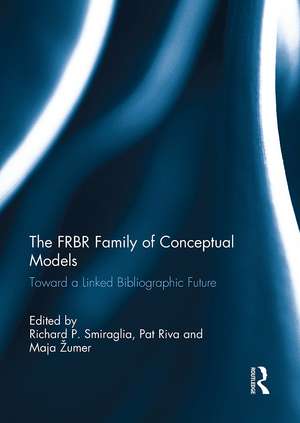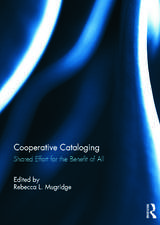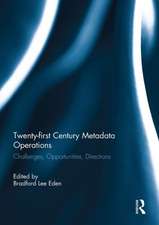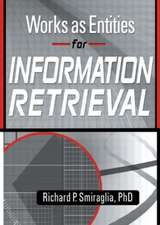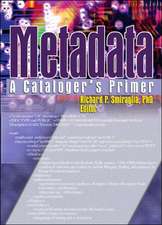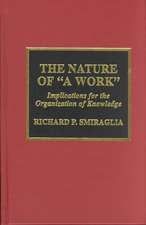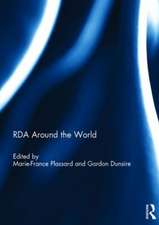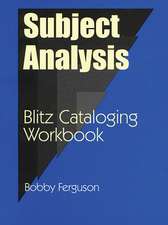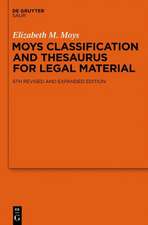The FRBR Family of Conceptual Models: Toward a Linked Bibliographic Future
Editat de Richard P. Smiraglia, Pat Riva, Maja Žumeren Limba Engleză Paperback – 14 oct 2024
Librarians of all stripes as well as library and information science students and researchers can use this volume to bring their knowledge of the FRBR model and its implementation up to date.
This book was published as a special issue of Cataloging & Classification Quarterly.
| Toate formatele și edițiile | Preț | Express |
|---|---|---|
| Paperback (1) | 267.20 lei 43-57 zile | |
| Taylor & Francis – 14 oct 2024 | 267.20 lei 43-57 zile | |
| Hardback (1) | 828.22 lei 43-57 zile | |
| Taylor & Francis – 7 mai 2013 | 828.22 lei 43-57 zile |
Preț: 267.20 lei
Preț vechi: 307.69 lei
-13% Nou
Puncte Express: 401
Preț estimativ în valută:
51.13€ • 53.53$ • 42.31£
51.13€ • 53.53$ • 42.31£
Carte tipărită la comandă
Livrare economică 07-21 aprilie
Preluare comenzi: 021 569.72.76
Specificații
ISBN-13: 9781032919850
ISBN-10: 103291985X
Pagini: 440
Dimensiuni: 174 x 246 mm
Greutate: 0.81 kg
Ediția:1
Editura: Taylor & Francis
Colecția Routledge
Locul publicării:Oxford, United Kingdom
ISBN-10: 103291985X
Pagini: 440
Dimensiuni: 174 x 246 mm
Greutate: 0.81 kg
Ediția:1
Editura: Taylor & Francis
Colecția Routledge
Locul publicării:Oxford, United Kingdom
Public țintă
AcademicCuprins
Foreword 1. Introduction: Be Careful What You Wish For: FRBR, Some Lacunae, A Review 2. The VTLS Implementation of FRBR 3. FRBR: The MAB2 Perspective 4. Implementing FRBR to Improve Retrieval of In-House Information in a Medium-Sized International Institute 5. A Strange Model Named FRBRoo 6. Item, document, carrier: An Object Oriented Approach 7. Modeling Aggregates in FRBR 8. Arrangement of FRBR Entities in Colon Classification Call Numbers 9. FRSAD and the ontology of subjects of works 10. FRBR Entities: Identity and Identification 11. FRBR/FRAD and Eva Verona's Cataloging Code: Toward the Future Development of the Croatian Cataloging Code 12. Evaluation of RDA as an implementation of FRBR and FRAD 13. Conceptualizations of the cataloging object: A critique on current perceptions on FRBR Group 1 entities 14. From the FRBR Model to the Italian Cataloging Code (and Vice Versa?) 15. The Contribution of FRBR to the Identification of Bibliographical Relationships: The New RDA-based Ways of Representing the Relationships in Catalogs 16. Analysis of Work-to-Work bibliographic relationships through FRBR: A Canadian Perspective 17. Composing in Real Time: Jazz Performances as "Works" in the FRBR Model 18. Identifying Works for Japanese Classics for Construction of FRBRized OPACs 19. FRBRizing Bibliographic Records Focusing on Identifiers and Role Indicators in the Korean Cataloging Environment 20. What do Users Tell us About FRBR-Based Catalogs? 21. Representing the FR Family in the Semantic Web 22. YouTube: Applying FRBR and Exploring the Multiple Description Coding Compression Model 23. FRBR and Linked Data: Connecting FRBR and Linked Data
Notă biografică
Richard P. Smiraglia has defined the meaning of "a work" empirically, and has revealed the ubiquitous phenomenon of instantiation among information objects. He is a member of the iSchool at UW Milwaukee’s Information Organization Research Group, author of the groundbreaking The Nature of ‘A Work’ (2001), and editor-in-chief of the journal Knowledge Organization.
Pat Riva is Coordinator of the Monographs Section in the Cataloguing Directorate for Heritage Collections at Bibliothèque et Archives nationales du Québec in Montreal, Canada. Since 2005, she has been an elected member of the IFLA Cataloguing Section Standing Committee and chair of the FRBR Review Group.
Maja Žumer is Professor of Information Science at University of Ljubljana, Slovenia. She is a member of the IFLA FRBR Review Group, Aggregates Working Group and FRBR/CRM Harmonisation Working Group. With her research group she is focusing on different aspects FRBR and has published extensively on these topics.
Pat Riva is Coordinator of the Monographs Section in the Cataloguing Directorate for Heritage Collections at Bibliothèque et Archives nationales du Québec in Montreal, Canada. Since 2005, she has been an elected member of the IFLA Cataloguing Section Standing Committee and chair of the FRBR Review Group.
Maja Žumer is Professor of Information Science at University of Ljubljana, Slovenia. She is a member of the IFLA FRBR Review Group, Aggregates Working Group and FRBR/CRM Harmonisation Working Group. With her research group she is focusing on different aspects FRBR and has published extensively on these topics.
Descriere
Functional Requirements for Bibliographic Records (FRBR) and its family of conceptual bibliographic models has revolutionized the cataloguing world since its inception in 1998. This anthology presents an up-to-date survey of implementations and extensions, catalog codes, research and approaches to using FRBR for the Semantic Web.
